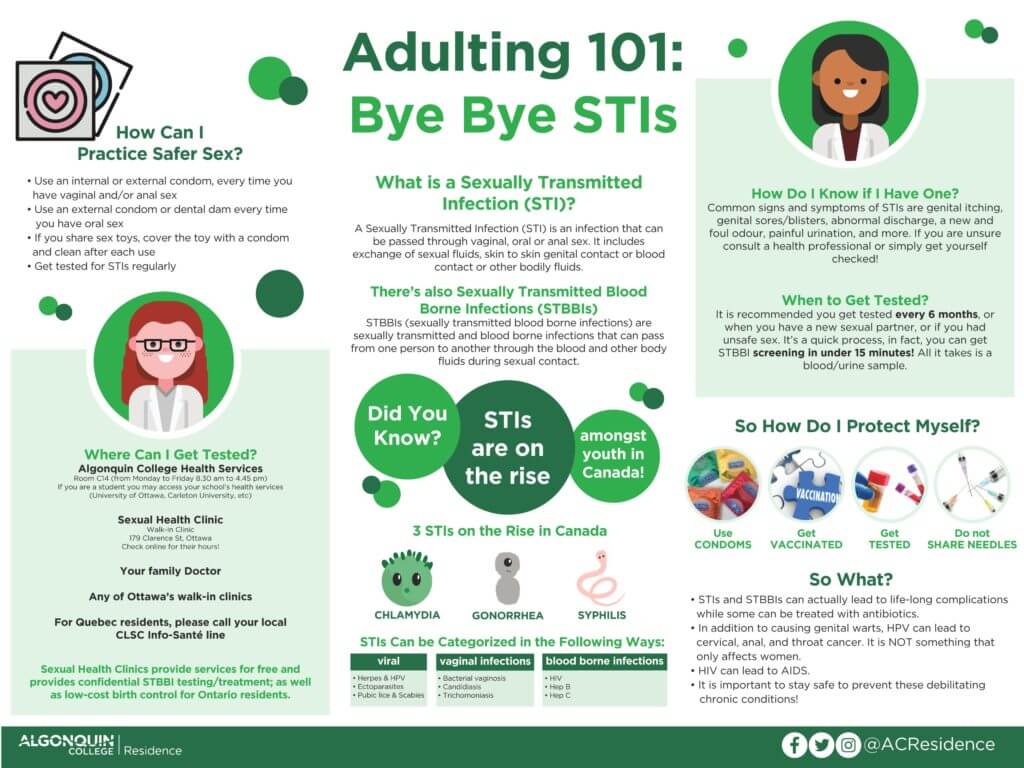Bye Bye STIs
 A Sexually Transmitted Infection (STI) is an infection that can be passed through vaginal, oral or anal sex. It includes an exchange of sexual fluids, skin to skin genital contact, blood contact or other bodily fluids.
A Sexually Transmitted Infection (STI) is an infection that can be passed through vaginal, oral or anal sex. It includes an exchange of sexual fluids, skin to skin genital contact, blood contact or other bodily fluids.
A Sexually Transmitted Blood Borne Infection (STBBI) is a sexually transmitted and blood-borne infection that can pass from one person to another through the blood and other body fluids during sexual contact.
STIs that are currently on the rise amongst youth in Canada include chlamydia, gonorrhea and syphilis. This is why it is so important to pay attention to your sexual health.
Check out all of the information below to stay in the know about STIs and STBBIs!
How are STIs Categorized?
STIs Can be Categorized in the Following Ways:
- Viral – eg. Herpes and HPV
- Ectoparasites – eg. Pubic lice and Scabies
- Vaginal Infections – eg. Bacterial Vaginosis, Candidiasis, and Trichomoniasis
- Blood Borne Infections – eg. HIV, Hep B, and Hep C
What Can STIs and STBBIs Cause?
STIs and STBBIs can actually lead to life-long complications while some can be treated with antibiotics. In addition to causing genital warts, HPV can lead to cervical, anal, and throat cancer. It is NOT something that only affects women. HIV can lead to AIDS; a chronic and lifelong illness that must be reported to all sexual partners.
It is important to stay safe to prevent these chronic conditions.
How Do I Protect Myself?
- Use condoms
- Get tested
- Get vaccinated
- Do not share needles or re-use dirty needles
How Can I Practice Safe Sex?
- Use an internal or external condom every time you have vaginal and/or anal sex
- Use an external condom or dental dam every time you have oral sex
- If you share sex toys, cover the toy with a condom and clean after each use
- Get tested for STIs regularly
How Do I Know If I Have an STI or STBBI?
Some common signs and symptoms of STIs include genital itching, genital sores/blisters, abnormal discharge, a new and foul odour, and painful urination. If you are unsure whether you have an STI or not, consult a health professional or simply get yourself checked!
Where Can I Get Tested?
Algonquin College Health Services offers STI testing. You can find Health Services in Room C141 and it is open from Monday to Friday, 8.30 am to 4.45 pm.
You can also find sexual health services at any of the following:
- Ottawa Sexual Health Clinic
- Your family Doctor
- Any of Ottawa’s walk-in clinics
- For Quebec residents, please call your local CLSC Info-Santé line
When Should I Get Tested?
It is recommended you get tested every 6 months, when you have a new sexual partner, or if you have had unsafe sex.
It’s a quick process, in fact, you can get STBBI screening in under 15 minutes! All it takes is a blood/urine sample.
